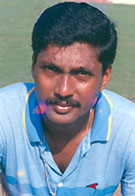Home > Sports > Hockey > Champions Trophy 2003 > Columns > Mervyn Fernandis
Midfield solidity needed
August 18, 2003
 Before India played its second match in the Champions Trophy, against an inexperienced German side, as an ardent Indian hockey fan, one was only looking forward to the team picking three vital points from the outing, and nothing less. It did not matter how it would come about, because there have been so many instances when the team had won the hearts of those watching the game with some fancy play but lost those crucial points.
Before India played its second match in the Champions Trophy, against an inexperienced German side, as an ardent Indian hockey fan, one was only looking forward to the team picking three vital points from the outing, and nothing less. It did not matter how it would come about, because there have been so many instances when the team had won the hearts of those watching the game with some fancy play but lost those crucial points.
On Sunday, the Indian hockey team may not have won the hearts of the hockey aficionado, but did well to pick the three points in a 3-2 victory over Germany [Images].
The Indians were unable to penetrate the German wall as one would have expected them to, but they scored from the half chances that came their way and emerged on top. A creditable result; full marks to Dhanraj and his boys!.
Looking back on the match, India were able to force one solitary penalty-corner in the entire game. Never before in the history of any major international tournament have we been restricted to just one penalty-corner and yet won a game. As is their wont, the German second string, or development squad as some would prefer to call it, did not allow the Indians space to carry the ball, which can be most frustrating. In fact, the moment an Indian got the ball he was forced to hastily release it, which led to a lot of wrong passing. Dhanraj Pillay was the most affected, but the class act that he is, he always looked dangerous when in possession. The other positive aspect was him and the rest of the team not getting ruffled by some body play by the Germans.
The decision to play Viren Rasquinha in place of Ignace Tirkey in the starting line-up was rather baffling, as I have never seen the Mumbai lad play in that vital 'left half' position before. However, to his credit, he did well to reaffirm the faith coach Rajinder has in him. But the coach could do well to have a settled midfield in the remaining matches as solidity in that department could prove vital against Australia, Pakistan and Argentina.
Because of the close man-to-man marking and body play by the Germans, it was only natural that there was not a single move worth the mention in the first half, except for that 'left-handed' goal by the Germans which gave them a 1-0 lead. The same left-handed goal by the Dutch, on the opening day of the tournament, spelt doom for India. This new technique, being adopted by almost all teams, poses a huge challenge to the best defences. That's because, besides being dangerous, it is also one of the most unpredictable weapons teams are beginning to use, as the ball flies in any direction and the goalkeeper, unsighted by the player turning, is unable to figure out which direction it is going in.
After being a goal down in the fist half, the Indians were more purposeful in the second. They knew well enough that they had just 35 minutes to make it or break it. And one good, lightning move transformed them. Dhanraj, Deepak Thakur and Gagan Ajit combined in inimitable style to catch the German defence napping and level the score 1-1.
But against the run of play the Germans scored off a penalty stroke, by Alexander Schamel, to snatch the lead again. Would we able to score again? As Indian fans kept chewing their nails, after nearly 60 minutes into the game, India were awarded their first penalty-corner. But the German custodian proved hard to beat. In the very next move, India forced a free-hit, which resulted in Prabhjot Singh meeting the diagonal ball well to tap home and make it 2-2.
In the match against the Netherlands, India paid a heavy price for failing to hold possession in the last five minutes. Things looked like going the same way today too as Jugraj began scooping the ball into the opposite defence in a bid to release the pressure. It is a cardinal mistake that the team seems to make in those crucial dying minutes of the game. If one thinks that by scooping the ball into the opposite defence the pressure can be released, he is wrong, because as fast as it is released, it comes back.
Fortunately, Gagan Ajit Singh, who has been improving with every international outing, scored from a half chance to steal victory and emerge the hero of the day.
All credit to the Indian side for having put behind the shocking loss to the Dutch and finishing with three very valuable points. It not only raised their stock but also kept them in the hunt for the title.
Previous columns:
- Top three finish possible
- A lesson in hockey
- Mervyn Fernandis represented India at the 1980, '84 and '88 Olympics [Images]. He also captained India at the junior World Cup in Versailles, France [Images], in 1979.